Haunted History Professor of History Mikki Brock’s Spring Term course explores our fascination with the supernatural.
“Studying the history of ghosts is inherently interdisciplinary – we dip into literature, anthropology, sociology, psychology, media studies and more – and ultimately, we examine how stories have shaped and continue to shape our world.”
~ Professor of History Mikki Brock
Anyone strolling in downtown Lexington last Thursday evening may have heard screams – and laughter – above the roar of the fireworks celebrating commencement exercises the following morning at Washington and Lee University’s School of Law. Students in Professor of History Mikki Brock’s History of Ghosts class recently spent a balmy spring evening exploring Lexington’s haunted history on foot, traversing downtown with Haunting Tales, Lexington’s ghost tour, for a chance to dip their toes into a paranormal investigation as part of Spring Term’s spookiest course.
Camilla Gowen ’23, a strategic communication major from Berwyn, Pennsylvania, said the ghost tour served as a warm-up for her final research project, which will explore the haunted history behind a train station in nearby Staunton with the help of a local paranormal investigator.
“This course has given me such a better understanding of the meaning of ghost stories and how they play a role in our society and culture,” said Gowen.
The course meets in W&L’s famously haunted Payne Hall and explores the history of ghosts within their wider historical, social and cultural contexts. Class discussions and readings encourage students to consider why the belief in ghosts continues to be vibrant and socially relevant, and invites them to examine how ghost beliefs and ensuing legends serve as vehicles for exploring and expressing historical memory and shaping history in the public imagination.
For their final project, students will work in pairs to investigate a local haunted site or explore a local ghost legend and create either a podcast or short film about their chosen Shenandoah Valley ghost story. Groups will then present their projects to the class, including research into their recorded ghost story’s historical or personal context. Students are investigating alleged hauntings at the Homestead Resort in Hot Springs, at the former Western State Hospital site in Staunton, and in various other locations in Rockbridge County.
“The goal is to create something entertaining and informative that offers a window into ghost lore and experiences in Lexington and the wider Shenandoah Valley,” said Brock.
Brock’s research focuses on early modern Scotland’s religious beliefs, identities, demonology and witchcraft. In addition to courses about the history of supernatural entities such as the devil, witches and ghosts, she has taught courses about early modern British history, the Reformation, early modern Europe and the history of poverty. The syllabus for this Spring Term course includes surveying the history of ghosts from medieval Europe to modern America, and the course culminates with the student-led oral history projects. The History of Ghosts course requires students to read Owen Davies’ book, “The Haunted: A Social History of Ghosts,” as well as several articles on ghosts from the perspective of historians and anthropologists. Prior to the Haunting Tales tour, the class read Tiya Miles’ “Tales from the Haunted South,” an examination of “dark tourism” and ghost tours in the southern United States.
The course’s central questions revolve around examining the historical context that creates ghost stories and the social function of such legends in an increasingly secularized world. As part of their coursework, students created their own version of a survey from the Pew Research Center for Religion and Public Life focused on the belief in, attitudes toward and encounters with ghosts in their communities. Brock said each class meeting has generated discussion on such diverse topics as religion, death, grief, race, gender and questions of reality, and that the students have responded to the course material with openness and curiosity.
“For me, it is tremendously exciting to show students that everything has a history, including the supernatural,” Brock said. “Studying the history of ghosts is inherently interdisciplinary – we dip into literature, anthropology, sociology, psychology, media studies and more – and ultimately, we examine how stories have shaped and continue to shape our world.”
Brock said the interdisciplinary nature of the course material has provided the opportunity to work with colleagues across campus. Students discussed Lakota cosmology and indigenous ghost beliefs during a visit from Professor Emeritus of Anthropology Harvey Markowitz, whose research includes American Indian religions and belief systems. W&L’s Director of Institutional History Lynn Rainville gave a presentation to the class about local ghost lore, graveyards and the work historians do to engage with those stories. Rainville has also served as a valuable resource for students as they research their final projects. In addition, an early class session was spent at Leyburn Library in Special Collections with Tom Camden, associate university librarian for special collections and archives, exploring items housed there related to local and regional ghost stories.
“Talking about something like ghost stories really does involve looking at the past in different ways,” said Camden.
Brock said the opportunity to visit what Camden refers to as “the vault” and see rare manuscripts in W&L’s Special Collections, including letters written by George Washington, was a particularly special moment for the class.
“The students were astounded,” Brock said. “Most of the students enrolled in this course are seniors and are not history majors, so having this opportunity to engage with these documents that really bring the past to life was a new and powerful thing.”
Estrella Burks-Parra ’23, a politics and theater double major and Law, Justice and Society minor from Whittier, California, said signing up for the class was an opportunity to explore a new and intriguing topic as she concludes her time on campus.
“Talking about ghosts in an academic setting almost seemed counterintuitive, so I was fascinated to dive into the history of this topic, learn and form my own conclusions,” Burks-Parra said. “I have really enjoyed the class camaraderie and how we balance doing academic readings, research and telling our own ghost stories. There is never a class where everyone hasn’t laughed at one point or another, and it’s been a great way to end my time here at W&L.”
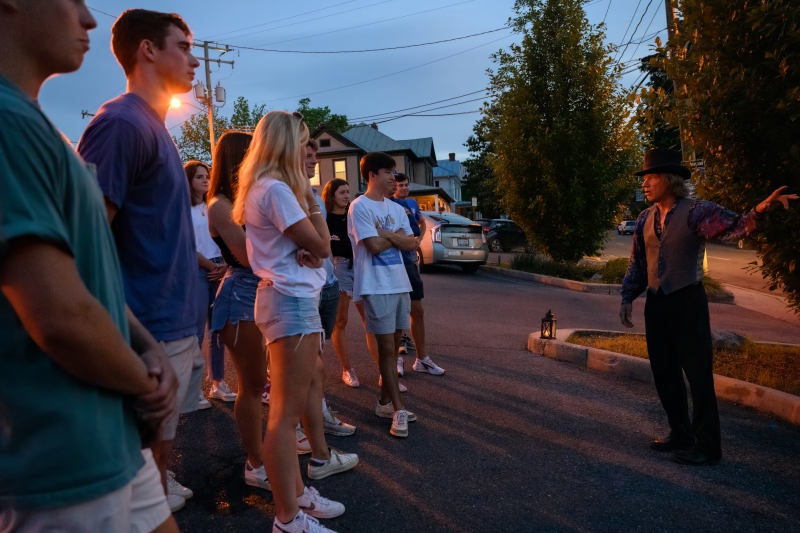 Mark Cline, owner of Haunting Tales, takes students on a ghost tour.
Mark Cline, owner of Haunting Tales, takes students on a ghost tour.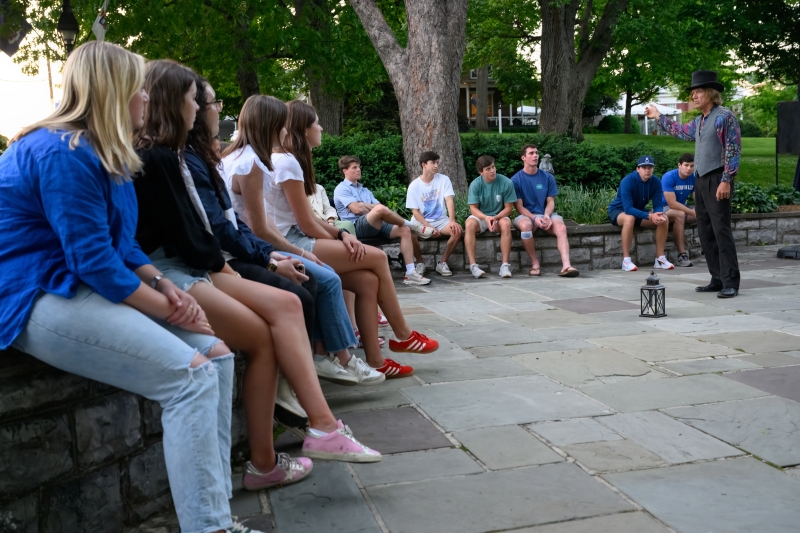 Cline shares the history behind W&L campus legends in front of Grace Episcopal Church.
Cline shares the history behind W&L campus legends in front of Grace Episcopal Church.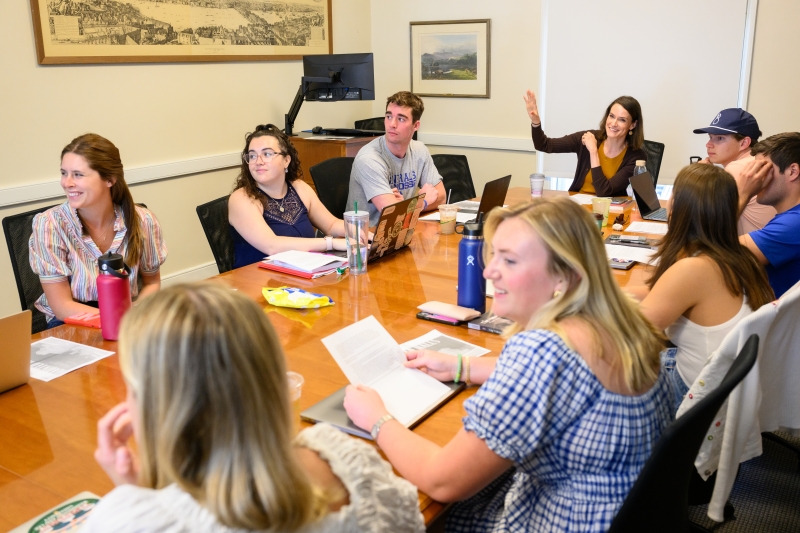 The class meets in Payne Hall, rumored to be home to several ghosts.
The class meets in Payne Hall, rumored to be home to several ghosts.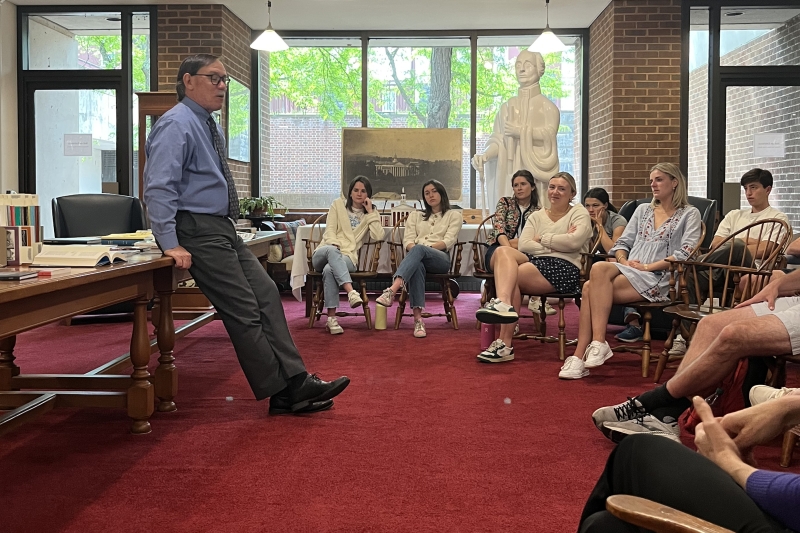 Associate University Librarian for Special Collections and Archives Tom Camden speaks to the History of Ghosts class.
Associate University Librarian for Special Collections and Archives Tom Camden speaks to the History of Ghosts class.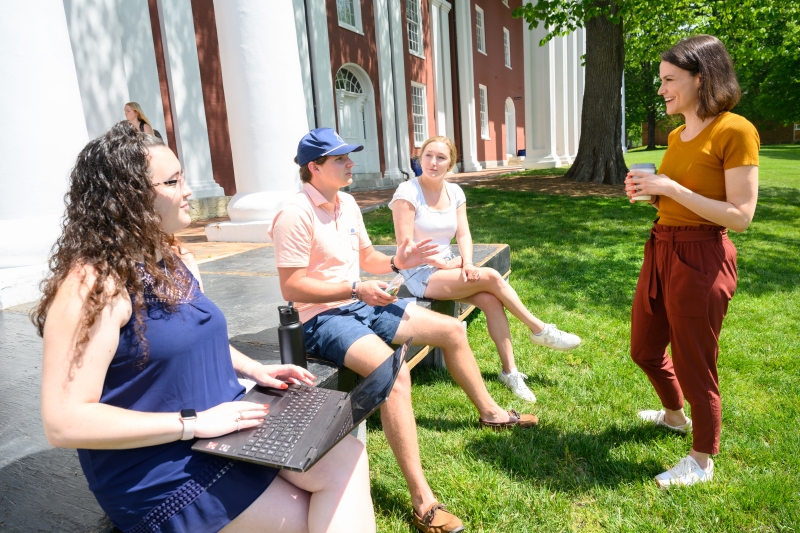 Brock meets with students on the Colonnade.
Brock meets with students on the Colonnade.
You must be logged in to post a comment.